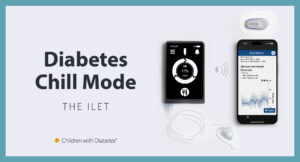Clinical Director
Substances and Diabetes
Everything seems to affect blood sugars, from food to exercise to stress, and substances are no exception. Some recreational substances, such as alcohol and marijuana have been well-studied, while others are less understood. Here’s what the current research says about some of the more common substances and diabetes. Tobacco Smoking has an incredibly high-risk profile for someone living with diabetes. This is because smoking significantly increases the risk of cardiovascular disease – such as heart attack or stroke, kidney disease and eye disease, all of which are already risks when you have diabetes.1 Smoking itself also raises blood sugar levels, […]
Read MoreExpectations versus Reality of Glucose Monitoring
Shaping Expectations at Diagnosis I feel very fortunate to not have much memory of my diagnosis. I was only 2 years old, and the only memories I have include a vague vision of a hospital room and my experience talking to my first diabetes psychologist. The diabetes psychologist memory is more vivid, and I remember coloring in a large room at a little toddler sized table and chair while a lady asked me questions. I remember thinking, “Why is she asking me questions? All I want to do is color.” What I do know about my family’s diagnosis experience I’ve […]
Read MoreDealing with Diabetes Tech Adhesives
Diabetes technologies hope to improve both diabetes management and the burden that goes along with it. Countless studies have shown that use of these technologies can do both things, but they are not without their challenges. The Panther Program from the Barbara Davis Center has a lot of great resources including their page about Skin Solutions. Here are some key recommendations about Skin and Diabetes Tech. Keeping Devices Attached Some people seem to have a lot of difficulty keeping devices attached – and summer, swimming, and anything that involves sweating can make it even more of a challenge. There are […]
Read MoreDiabetes Chill Mode — the iLet
In my lifetime, there have been so many incredible advances when it comes to tools for keeping blood sugars in “target” as much as possible. I am so grateful for all these things – from rapid-acting insulins to CGMs (continuous glucose monitors), life with diabetes can be so much easier. But the thing is, even when using the latest technologies, there remains a constant to-do list for diabetes. When I start to feel hungry, on top of trying to figure out what to cook for dinner every night, I consider how many carbohydrates to prepare based on where my CGM […]
Read MoreBarriers to Screening in Type 1 Diabetes
Barriers to Screening in Type 1 Diabetes Anita Swamy1, Marissa Town2, William H Polonsky3,4 1 Chicago Children’s Diabetes Center at La Rabida Children’s Hospital, Chicago, Illinois; 2 Children With Diabetes, West Chester, Ohio; 3 Behavioral Diabetes Institute, San Diego, California; 4 University of California San Diego, La Jolla, California Abstract Since the consensus in opinion and publication of scientific evidence to support the staged progression of Type 1 diabetes (T1D) in 2015, individual and collaborative efforts to identify people in early stages of T1D have emerged globally providing further supportive evidence of the benefits of islet autoantibody screening. Despite strong […]
Read MoreStress and Blood Sugars
The amount of stress that we have undergone as humans in the last few years has been ridiculous. This is certainly not how I imagined I would be spending my adult life. It feels like every chance we get to come up for a breath after drowning in major horrible world event after major horrible world event, another awful thing happens. Even reading the word stress makes my heart rate go up. Stress & BGs When you experience stress – even if it’s positive stress – it can raise your blood glucose levels. This is because our bodies react in […]
Read MoreWhat are Biosimilar Insulins?
“Wow! Look! They gave me six vials of insulin! FOR FREE! I paid nothing!” I vividly remember the first time in my adult life that I didn’t have to worry about the amount of insulin I had through my insurance. I came home and told my husband that. His reply was so poignant and true, “that’s like me being excited for oxygen.” I remember being afraid to leave the pharmacy in case they were going to mail me a multi-thousand-dollar bill later and asked the pharmacist twice before leaving, “Are you sure?” And I remember her understanding my fear. Everybody […]
Read MoreDo you Gluroo?
When Greg Badros’s son was diagnosed with type 1 diabetes, his family quickly embraced diabetes technology, including a CGM and mobile apps. But what they found is that they didn’t have a good way of tracking multiple diabetes devices’ data with multiple caregivers. Luckily for other parents and loved ones of people with diabetes, Greg knew how to design software to help fill this much-needed gap. So, he developed Gluroo, a mobile app to help you log and track all things related to diabetes that affect families. Using Gluroo There are some devices or requirements needed to use GluRoo, but […]
Read MoreManual Mode
For the last five weeks, I have been doing multiple daily injections (MDI). This was the longest time that I have ever been on MDI in my life. After years of twice-daily split-mixed injections with regimented routines of breakfast – snack – lunch – snack – dinner – snack, I opted to get an insulin pump at age eleven because I wanted to sleep in on the weekends. I have been using a pump of some sort ever since for a total of 24 years so far. I decided to try basal-bolus injections around eight years ago because I had […]
Read MoreLatest Research on Women with Diabetes
Did you know that women and girls have been repeatedly excluded from research throughout history? In fact, after thousands of babies were born with severe birth defects from a medication for morning sickness, the Federal Drug Administration (FDA) banned women from participating in research if they were able to get pregnant.1 It’s understandable to want to prevent severe birth defects from happening to thousands of babies again, but that does not mean that women should be excluded from research. The challenge now is that there remains a large gap in research about women in general, but luckily there are many […]
Read More









